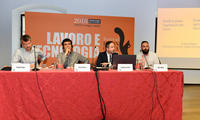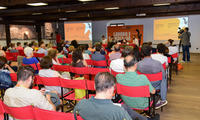
Andrea Segre explains “At the Edmund Mach Foundation (FEM) we have a 150 years history in agricultural consultancy and technical assistance here in Trentino. Even a long time ago we started introducing innovation in agriculture through the trekking teacher, a sort of technical advisor visiting farmers in their valley.” Fabio Zottele added that “Our students at FEM are the farmers of the future and they are already looking forward. To give an example, we carried out a survey within our students asking them to imagine agriculture in the future. In their replies, students have all considered drones, smartphones ad digitalization. Drone use is indeed a growing reality in agriculture and students, teachers and technicians should all become drone pilots. Today students somehow are already smart , and drone use in agriculture offers a wide range of application. Anyway, it is important to understand that there does not exist a technology that works for everyone
Cassiano Luminati pointed out the progress of the Peschiava valley.“In our Peschiava Valley (a small territory with just 5,000 people in the Italian part of Swiss) we are proud to be already smart as well as green: to give an idea, in our valley we started bio-agriculture in the 1980s and now bio-production amounts to 95% of total agricultural output. The main principle of the Peschiava Valley is expressed by the slogan “transmitting tradition to the new generation, and innovating at the same time. For this purpose we created AlpFoodWay which promotes traditional alpine food culture. We worked on territorial marketing as our Retica Railroad is an Unesco patrimony and focused on some historical products of the valley because our buckwheat we are able to sell at much higher prices, compared to the market ones”.
Daniel Zimmer stated “Climate change is affecting agricultural production and we, as a technicians, should provide farmers with innovative products and services, allowing them to better handle the challenges of climate change”. To solve climate change troubles, Zimmer believes the first action to put in place is sustainable land use. “Agriculture together with food industry are responsible of 25% of total world CO2 emission, so there is no more time it is urgent to act now, with new technology applications but above all with a new mentality “Promoting a circular economy (a productive cycle in which parts of one product are reused in other productive processes), shrinking the distance between towns and country and setting up a regenerative agriculture, not exploiting resources but on the contrary finding synergy with different culture”.
In the conclusion, Segrè says: “Many best practices are now already available for both technological or cultural change, but one of the most important feature for green and smart agriculture is food education. To reconcile food consumption with agriculture is our priority.”
https://twitter.com/economicsfest









